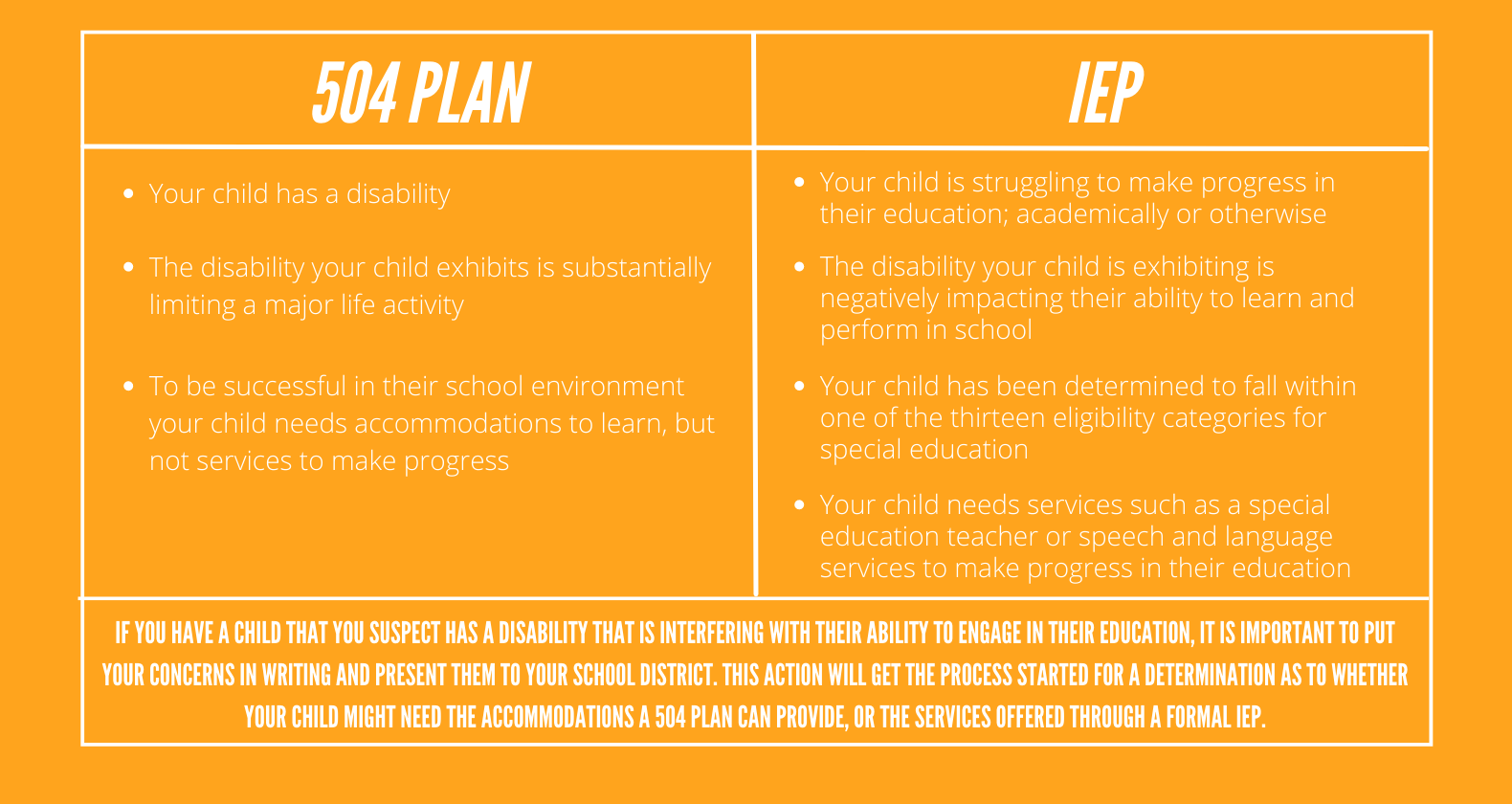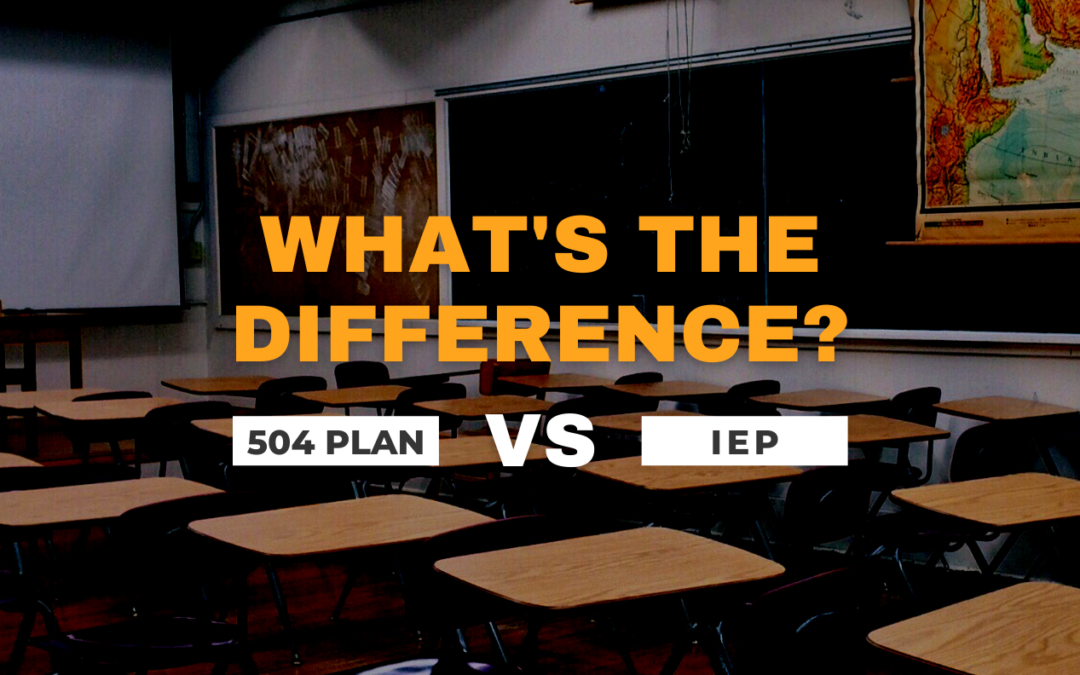Oftentimes parents contact the school district because they are concerned about their child’s learning progress. In many of these situations, parents are unsure as to what their child might need in order to do better in their learning environment. Depending upon the school district’s response to the parent’s inquiry, the options that the school district might offer, such as a 504 Plan versus an IEP, and their differences, may be unclear to parents. But the differences between these two plans are significant. Therefore, it is important for parents to be fully informed as to the details and differences between these two options so that they can make an informed decision as to whether the option being offered to their child is the best one for them.

Under section 504 of the Rehabilitation Act, a student who exhibits a mental or physical disability is considered to have civil rights that are protected in the event that they need accommodations to successfully participate in their right to a free and appropriate public education. The Act protects children who attend a public school or a private school that receives public funding.
Accommodations can be afforded to a child for a variety of needs. For example, if a child only needs extended time when taking a test to have an equal opportunity to perform as well as his peers, then a 504 Plan can provide that accommodation. This example is one in which it is easy to see that the child’s need can be met with an accommodation. Here the child’s disability, overall, does not lend itself to needing specialized teaching attention or other services, such as speech and language or occupational therapy, to participate and make progress in their school environment. The child can successfully engage and learn, in the regular education classroom, without the need for specialized instructional intervention.
The legal protections under a 504 Plan are not as extensive as an IEP. With a 504 Plan, your child will be protected with regard to whatever accommodations, or possible modifications, are needed in their school day to allow them to take full advantage of their public education. Under a 504 Plan, parents have the right to be informed about their child’s accommodations and/or modifications and any other issues relating to their child’s disability. If your child has a 504 Plan you also have the right to request your child’s education records. Also, parents can utilize the due process system if they do not agree with the schools offer of accommodations and/or medications for their child. However, parents are not afforded the right to request the district pay for independent assessments to provide an opinion on accommodations and/or modifications that differ from the districts. In addition, if your child has a 504 Plan you do not have the right to request services for your child.

Under the Individuals with Disabilities Education Act, a student who exhibits a mental or physical disability also has a right to a free and appropriate public education. Again, these rights are afforded to students who attend a private school that accepts public funding. However, a child who is found eligible for an IEP under the IDEA is entitled to more than just accommodations to help them access their education.
Under the protections of an IEP, a child who exhibits a disability is also entitled to services for academics, speech and language, occupational therapy, physical therapy and adaptive physical education, to name a few. While every child may not be entitled to all of these services, even if a child with a disability needs one of these services, then an IEP is the most appropriate choice for them.
Unlike a 504 Plan, the process for securing an IEP is a bit more involved. There are a few ways a child can be identified as one that needs to be assessed for special education services. The two most common ways are for the parent to request their child be assessed for special education services, or for the school district to contact the parents and initiate a request to assess the child. With either situation, once a parent consents to their child being assessed, the school district will provide the parent with an assessment plan. The assessment plan will indicate what areas of suspected disability exist and the corresponding type of assessment(s) that the school district will administer. The assessment plan will also indicate the type of professional who will be responsible for implementing the assessment(s). For example, a speech and language assessment will be completed by the school’s speech and language pathologist. However, the specific name of the individual who will administer the assessment(s) will not necessarily be noted.
Once the assessment process is complete, the school district will hold an IEP meeting for the parents and the team to review and discuss the outcome of the assessment(s). If the child is found eligible for special education services, the team and the parents will discuss the types of services the child will need to adequately access their educational environment. These services are only offered through being deemed eligible for special education services and will be delivered via an IEP. The services can include; specialized academic instruction, speech and language, occupational therapy, adaptive physical education, physical therapy, social emotional behavioral services such as individual and group counseling, to name a few. In addition, it is also possible the student’s classroom, otherwise known as their educational setting, could be changed. Therefore, if your child is in a general education classroom but would be better served in a more supportive educational environment, it is possible their setting will be changed.
Legally, an IEP offers more protections for both the parent and the student. These protections are numerous and can be found in the parent’s copy of Procedural Safeguards. At every IEP meeting the school district must offer parents a copy of their Procedural Safeguards. This document outlines all of the rights of both the parent and the student. While it is a document that can appear intimidating, we recommend that all parents review it and read it at least annually. By being familiar with your legal rights and the legal rights of your child, you will be better able to advocate for your child’s needs.
Determining if your child needs either a 504 Plan or an IEP can be difficult, at best. However here is a short checklist that might help you, as a parent, to make an initial determination as to what to ask the school district for:



Recent Comments